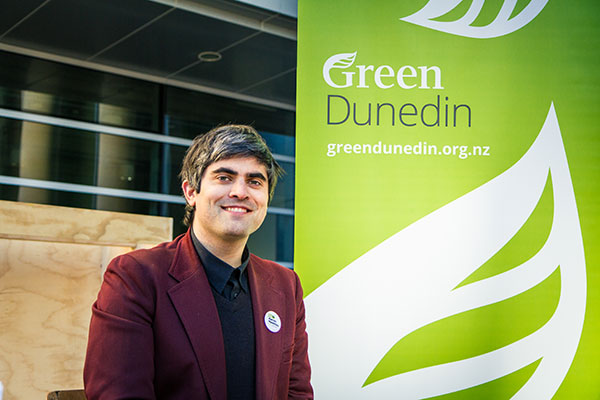Campus Produces Two Council Hopefuls
Aaron Hawkins, who came fourth in the 2010 mayoral election with three per cent of the first preference votes, is standing again, this time for the Green Party. The Radio One breakfast presenter has lived in Dunedin since 2002, and describes himself as “passionately interested” in local body politics.
Hawkins, who has previously compared the council to a country club, said he offered “new blood and new ideas,” and says green jobs, green housing and green transport are what the city needs. The Green candidate aims to increase the number of “jobs which are sustainable in the long term,” by increasing small-scale renewable energy production in the city. “The DCC currently runs a scheme called Warm Dunedin. I’d like to see that expanded to businesses to invest in more efficient energy systems that will save them money in the long term.”
Hawkins also said that he would fight to keep 77 workers employed in the loss-making construction wing of council-owned company Delta, claiming that “the real concern … is the lack of governance that allowed it to be in the position that it is in.”
Asked about the Green Party’s plans to implement a WOF-style licensing system for housing, Hawkins said “we certainly need to be doing what we can at a local level to improve the quality of our housing stock.” He did not believe that students should be allowed to live in colder, damper flats for lower rent, saying that rental properties should meet certain standards just as cafés were required to have health certificates. Hawkins said “I don’t think it’s inevitable” that rent would rise if increases in house quality were enforced, and insisted that if they did, policy mechanisms could be created to prevent tenants being hit in the pocket.
The green transport offered by his campaign slogan “could” include buses, trams or trains, but would certainly include improved cycle lanes to increase the percentage of trips taken by bike. However, Hawkins was critical of the DCC’s Quiet Streets programme – in which speed limits are lowered to encourage cycling in South Dunedin – saying “I worry that we are investing in expensive window-dressing.”
Hawkins said that a DCC under his mayoralty would be “a more proactive council that goes out and seeks opinion – I mean, when was the last time you saw a DCC presence on campus?” Hawkins was not deterred by low student turnout, saying “we can’t make people vote, but we can give them something worth voting for.”
Co-President of Students for Environmental Action Letisha Nicholas announced her candidacy for the council on Friday. Nicholas, a postgraduate Geography student, is standing with Mayor Dave Cull’s Greater Dunedin team after being encouraged by friends. She believed the skills she had learned around strategic environmental planning would be particularly useful in the role. “I really feel like young people should be involved in decision-making, especially because we’re the ones that have to live through the decisions … There are councils in the North Island which are an average of 70 years old making 30-year plans.”
Nicholas is a flatmate of “The Shit-show Chateau,” a housing renovation project, and says that improving student housing should be a priority for the council. However, she was unsure how this goal might be achieved. Reducing council debt and keeping rates increases low was also high on her agenda. Nicholas said she could not imagine the two priorities conflicting, but would defer to public submissions rather than her personal preferences if they did.
As an environmentalist, Nicholas said “climate change is a big issue,” but believed that the council could not confront the issue alone. She opposed oil drilling off Dunedin’s coast and believed that renewable energy could provide jobs for local people, but said she would not support new hydro dams. Nicholas also favoured the current council’s efforts to retain graduates in Dunedin.
Nicholas believed that she could help the council to make “considered decisions … using science and best practice.” For now, her campaign efforts would comprise a student enrolment drive. “Students make up a huge percentage of the potential vote and only 50 per cent have registered to vote.”








